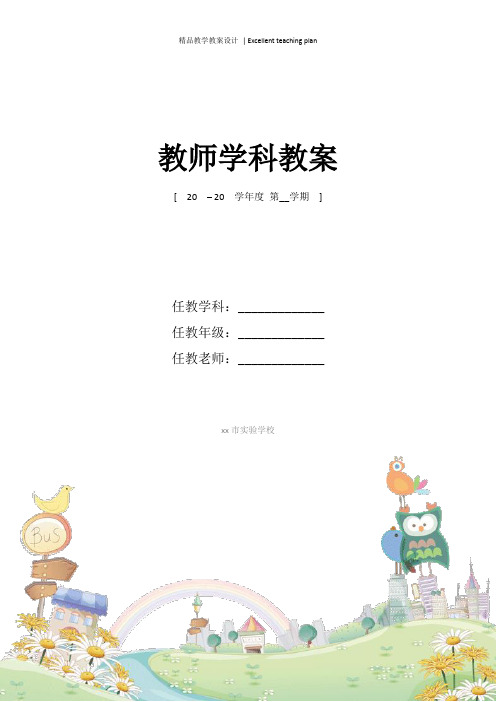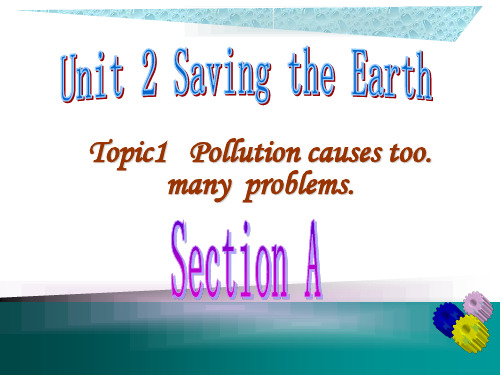九上U1T1SALi
2019年仁爱版初中英语九年级上册U1T1SD优质课教案

Section DⅠ. Material analysis本课是九年级第一单元第一话题的第四课时,是一堂复习课。
通过Grammar和Functions总结现在完成时的基本结构“have/has done”和一些重要的表达法;1a承接Section C,继续谈论“变化”在中国休闲活动中的体现,进一步提升阅读能力,并培养学生利用图表形式降低阅读难度的策略。
1b部分的问题有的立足于短文,有的则立足于生活常识和个人爱好,但又和短文有紧密的联系:都是谈论休闲活动。
Project引导学生通过制作海报探究休闲生活的今昔差异,培养学生的口语表达能力和动手动脑的能力,让学生更好地了解过去,珍惜现在的美好生活。
Ⅱ.Teaching aims1.Knowledge aims:掌握本课的重点词汇和短语,复习现在完成时和重点表达法。
谈论日常休闲生活的变化。
2.Skill aims:培养学生的阅读能力和阅读技巧。
培养学生能通过语境,扫清阅读障碍的能力。
3.Emotional aims: (optional)让学生更好地了解过去,珍惜现在的美好生活。
4.Culture awareness: (optional)Ⅲ. The key points and difficult points1. Key points:Words and phrases: hide, chess, radio, spare, abroad, leisure, hide-and-seek, recentleisure activities, play an important part/role in…, play hide-and-seek, play chess/cards, various kinds of…, in recentyears, make a tour abroad2. Difficult points:能学会归纳话题中重点语法和表达法。
仁爱英语九年级上教案新部编本参考U1T1SAU1T2SD

教师学科教案[ 20 – 20 学年度第__学期]任教学科:_____________任教年级:_____________任教老师:_____________xx市实验学校Section DⅠ. Material analysis本课是九年级第一单元第二话题的第四课时,是一堂复习课,主活动是1和Project。
学生通过Grammar和Functions来巩固本话题的语法重点现在完成时以及本话题重点功能句,尤其是要体会现在完成时的标志性副词的用法和区别。
1通过对比北京和加拿大小镇的生活方式,要求学生关注不同的生活环境,并进一步提升阅读能力,教会学生利用图表突破阅读障碍的策略。
2要求学生运用课文知识,根据自身的喜好来选择居住地,写篇小短文。
其实是在让学生为城乡生活找到更多的各自的优点。
Project的活动还是和人口有联系。
只是范围由国家变成小家。
通过小家来反映人多和人少的优劣,并让学生了解不同的家庭类型。
通过城乡生活的对比,让学生关注不同的生活方式,从而为学生树立正确的居住观念。
Ⅱ.Teaching aims1.Knowledge aims:掌握本课的重点词汇和短语,复习现在完成时和重点的表达法。
谈论不同的生活环境和生活方式。
2.Skill aims:培养学生的阅读能力和阅读技巧。
培养学生能通过看图表理解文章,扫清阅读障碍的能力。
增强知识迁移能力,模仿并掌握写作技巧。
3.Emotional aims: (optional)比较不同的生活方式,为自己的理想生活而努力。
4.Culture awareness: (optional)引导学生了解不同地域的不同生活方式,以及中西方文化和人口差异的密切联系。
Ⅲ. The key points and difficult points1. Key points:Words and phrases: local, capital, huge, market, excellent, surround, garbage,discourage, transportationclose to; discourage doing sth.Sentences: I live in a small town called Fairmont.The small town is surrounded by trees.2. Difficult points:巩固现在完成时中标志性副词的用法及区别。
最新九年级仁爱版英语上册U1T1SD

take exercise Have you ever taken exercise?
go climbing Have you ever gone climbing?
Pair work
Example:
A: Have you ever ...?
B: Yes, I have.
No, I haven’t. But I have ...
How
popular with The organization is very _______ young people in their community. two years ago The writer joined it _____________.
When What
How How many
现在完成时
肯定句:主语+have/has+过去分词
否定句:主语+ haven’t/hasn’t+过去分词
疑问句:Have/Has+主语+过去分词
A: Where have you been?
B: I have been to the park.
sb. have/has been to…
A: Where has Mr. Lee gone?
Have you ever cared for the old?
watch a movie in the open air
Have you ever watched a movie in the open air?
go roller skating
Have you ever gone roller skating?
helping them do some housework, we sang, danced and played
仁爱英语九年级U2T1SA

直接引语和间接引语
• 直接引语:直接用引号引用或复述别人的 原话,此部分内容即直接引语。 • 间接引语:用自己的话转述别人的话,被 转述部分就叫间接引语,间接引语不用引 号(常用宾语从句或复合宾语) • 直接引语变为间接引语时要注意语序,人 称,时态及时间状语的变化。
直接引语变成间接引语,句子结构的变化 •1.直接引语是陈述句时 •把直接引语变为that引导的宾语从句,that也可省 略。。主句的谓语动词可直接引语中的said, 也可用 told来代替,注意:可以说said that, said to sb that, told sb that.不可直接说told that。
Topic1 Pollution causes too. many problems.
Topic1 Pollution causes too. many problems.
• Now,look at the picture .What can you see in the picture?
Studying aims(1min)
解题步骤: 陈述句:
“I don’t like computers,” Sarah said to her friends.
Sarah said to her friends that I don’t like computers. Sarah said she didn’t
Sarah said to her friends that she didn’t like computers.
单选
1 I saw Jack __soccer there when I walked
past the playground .
A .to play B. playing C. played D .play 2 Too much sweet food is -------to your health .You’d better have more vegetables and fruits. A .friendly B .harmful C .useful D. important 3 -The teacher asked me to hand in our exercise books to her after class . ! I left mine at home . A. Forget it B . Oh ,my god! C .Don’t mention it D. Good luck
仁爱英语九上U1T1SA

C 3. –– Hi, Kangkang, where have you______?
A. gone
C. been
B. been to
D. gone to
B 4. He got up ______ late that he was late for work today.
2.A: Where have /has ... gone? B: ... have/has gone to …
1c Pair work
A: Where have/has ... been? B: ... A: What did ... do? B: ... A: Where is/are ...? B: ... have/has gone ... A: When will ... come back? B: ...
A: Where have you been? B: I have been to the museum.
sb. have/has been to … 某人 去过……(去而复返)
A: Where has Mr. Lee gone?
I can’t find him. B: He has gone to the
2 Work alone
1. A: Where ______ you ______? have been have been B: I ______ ______ to my grandma’s home. Where feeling well. I have a cold. 2.A: I’m not have you been? Have been B: ______ you ______ to the hospital ? A: Yes, I have.
九年级英语上册U1T1的知识点

九年级英语上册U1T1的知识点九年级英语上册的第一单元是关于家庭的话题。
通过这一主题,学生们可以学习家庭成员的称呼、描述家庭成员以及讨论家庭关系等知识点。
在这篇文章中,我将重点介绍几个重要的知识点。
首先,我们来学习家庭成员的称呼。
在英语中,我们通常使用"father"来称呼父亲,"mother"来称呼母亲,"brother"来称呼兄弟,"sister"来称呼姐妹。
除此之外,还有一些拓展的家庭成员称呼,如"grandfather"代表祖父,"grandmother"代表祖母,"uncle"代表叔叔或者舅舅等。
这些称呼在日常生活中经常被使用,掌握它们对于描述家庭关系至关重要。
其次,我将介绍描述家庭成员的形容词。
在英语中,我们可以使用各种不同的形容词来描述家庭成员的特点。
比如,我们可以用"tall"来形容一个高个子的成员,用"short"来形容一个矮个子的成员。
此外,我们还可以使用"young"来形容一个年轻的成员,使用"old"来形容一个年长的成员。
这些形容词可以帮助我们更好地描述我们的家庭成员。
接下来,我将讨论家庭成员之间的关系。
在英语中,我们可以使用一些短语来表达这些关系。
比如,我们可以用"my father"来形容我和父亲之间的关系,用"her sister"来形容她和姐妹之间的关系。
此外,我们还可以使用"his parents"来形容他和父母之间的关系,使用"our grandparents"来形容我们和祖父母之间的关系。
这些短语可以帮助我们准确地表达家庭成员之间的亲属关系。
最后,我想强调口语交流的重要性。
九年级上册U2T1SA知识点

九年级上册U2T1SA知识点九年级上册第二单元第一课的知识点涉及到一些重要的词语和短语,同时也包括了一些语法和句子结构的用法。
本文将针对这些知识点进行探讨,并以一些例句来加深理解。
首先,我们来看一些重要的词语和短语。
在这一课中,我们学习了一些学科和学校相关的词汇,例如 "mathematics"(数学),"geography"(地理)和 "history"(历史)。
此外,我们还学习了一些表示身份、领域或国籍的词语,如 "student"(学生),"teacher"(老师)和 "Chinese"(中国)。
例句:1. I have mathematics and geography classes in the morning.(我上午上数学和地理课。
)2. Mr. Zhang is our history teacher.(张先生是我们的历史老师。
)3. They are Chinese students.(他们是中国的学生。
)除了这些词语,我们还学习了一些表示时间的词汇和短语。
例如 "weekend"(周末), "every day"(每天)和 "next month"(下个月)。
例句:1. I usually play basketball on the weekend.(我通常在周末打篮球。
)2. My brother reads books every day.(我弟弟每天都看书。
)3. We are going on a trip next month.(我们下个月要去旅行。
)接下来,我们来讨论一些语法和句子结构的用法。
在这一课中,我们学习了一般现在时的肯定句和否定句,以及疑问句的构成。
一般现在时的肯定句结构为:主语 + 动词原形(第三人称单数加-s)+ 其他成分。
仁爱英语九年级上册U1T1sA

学科: 授课教师: 授课时间:Unit 1 The Changing WorldTopic 1 Our country has developed rapidly.Section AⅠ. Material analysis本课是九年级第一单元第一话题的第一课时。
本课内容丰富,主活动为1a 和3。
1a 部分通过“谈论假期经历”初步感知现在完成时 “have/has been to 和 have/has gone to” 的用法。
1b 引导学生运用抓关键字词完成表格的方法,培养学生的听力技能。
1c 则是培养学生运用关键词复述课文的能力。
2a 通过创设新的语境,在听的过程中进一步体会“have /has been to 和 have/has gone to”。
然后在2b 中让学生通过小组合作的方式总结它们的区别。
通过前几个步骤的学习,学生完全可以口头运用“have/has been to 和 have /has gone to”来进行 3的对话操练。
这样,在听、说、读、写各个方面都对新语法进行了全方位地复现和操练,有利于巩固新知识。
通过谈论假期生活,既可以相互增长见识又可以增进同学间的友谊。
Ⅱ.Teaching aims 1.Knowledge aims :掌握本课的重点词汇和短语,初步学习现在完成时。
2.Skill aims:培养学生的听力能力。
培养学生的口语表达能力。
能通过整合对话内容,提升综合语言运用能力,为语言输出做好准备。
3.Emotional aims: (optional)引导学生了解不同的假期生活,热爱生活,增进友谊。
4.Culture awareness: (optional)通过了解不同的假期生活,引导学生关注不同的生活方式有不同的人生意义,培养他们热爱生活的品质。
Ⅲ. The key points and difficult points1. Key points:Words and phrases: bell, take place, volunteer, have/has been to…, have/has gone to…, so…that…, by the way, be happy to do…Sentences: There goes the bell. /It must be fun.Grammar: Present Perfect (have/has been to和have/has gone to的用法)2. Difficult points:能通过听、说和读的方式感知并掌握have/has done的用法。
- 1、下载文档前请自行甄别文档内容的完整性,平台不提供额外的编辑、内容补充、找答案等附加服务。
- 2、"仅部分预览"的文档,不可在线预览部分如存在完整性等问题,可反馈申请退款(可完整预览的文档不适用该条件!)。
- 3、如文档侵犯您的权益,请联系客服反馈,我们会尽快为您处理(人工客服工作时间:9:00-18:30)。
1.He has cleaned his room.
(一般疑问句) _____ Has he _______his room? cleaned
2. They have come back from work.
haven’t They________come back from work.
现在完成时否定句:have/has+not + 过去分词
Oh, she has gone to the library.
现在完成时:
have/has + 过去分词
现在完成时
过去
一般过去时
现在
将来
现在完成时表示:过去发生 或已经完成的的某一动作, 对 现在造成的结果或影响。
现在完成时结构: 肯定句:have/has + 过去分词 否定句? 疑问句?
现在完成时的疑问句:Have/Has +主语+ 过去分词
Unit 1 The Changing World
Topic 1 Our country has developed rapidly.
Section A
We have been to Hainan. I have been to Chengdu
I have been to Jiu Zhaigou
have been to Cuba to这肯定很有趣 I ___________ be a volunteer.
Michael: Really? It must be fun.
Maria: Yeah, I enjoyed the work. Do you know where Jane has been for her summer holiday? __________
Mount Huang Cuba
Australia Africa
the Great Wall Hangzhou
London America
合作探究1 区别 have/has been to; have/has gone to • • • • • • •
去过某地(已经回来) have/has been to.... "_______", have/has gone to...."________", 去了某地(还没回来) 她去过湖北。 has been to Hubei. She____ _____ ____ 她已经去了湖北。 has gone to Hubei. She ____ ____ ____ e.g. 我们去过西藏。 We have been to Tibet.
She has been to Changlong.
He has been to Africa during this summer holiday.
Guess(3分)
A: Where has Olivia gone? I can’t find her. B: She has gone to the library.
Did you have a good summer holiday?
A: Where have you been?
B: I have been to... A: What did you do? B: I took many beautiful photos. A: How was your trip ?你的旅行怎么样? B: It was great/ wonderful.
(写否定句)
1. –– Where is Zhao Ming? –– He _____ the playground. He is playing football there. B A. has been to B. has gone to C. have been to D. goes to 2. Great changes ____ in my hometown. A A. have taken place B. take place C. have happened D. happened 3. –– Hi, Kangkang, where have you_____? –– The bank. C A. gone B. been to C. been D. gone to 4. He got up ______ late ______ he was late for work B today. A. such...as B. so...that C. very ... that D. too...to
2a Listen to the conversation and fill in the blanks. Then practice it with your partner. 好久不见 Michael: Hi, Maria, long time no see. Wherehave ______ you been _____? Maria:
g Maria
Cuba to be a ______ has gone to volunteer
and she will be back tomorrow ___________
1.Read 1a together.
2. Retell :Where has Rita been?
Key phrases and expressions in 1a: be happy to see 1.高兴看见...____________________
7. 如此……以至于……
ringing.
so … that … ____________
have/has 8. 到……去了( 还没回) ___________ =That’s the bell. = The bellgone is to
Task 3
• 1. Great changes have taken place there and my hometown has become more and more beautiful. happened (同义句) Great changes have ______ there. 填空: happened Something bad has ______ to him. 有计划的发生 区别:take place ________ 突然发生 happen _________
2. But there were so many people that I couldn’t find a proper place to take photos.(同义句转换) too many people for us There were _____ to ______ find a proper place to take photos.
A: Where have you been? game) (人名,地点 B: I haveA: been Where to Mount have Huang you been? . A:WhereB: has I have Maria been gone? to ........ B: She has A:Where gone to has Cuba _____ . Shegone? is still there and will be back tomorrow B: She/ He . has gone to .......
3. There goes the bell. Here comes a boy. 1)看,来了一辆公共汽车。 comes ___ a bus Look! There ______ ____. they come 2)他们过来了。Here _____ _____.
人称代词 时,句子局部倒装 注意:如果主语是_________ • 如果主语是名 ___词,句子要全部倒装。
Find the sentences with Present Perfect Tense in Section A.
Read them aloud.
You have just come back from your hometown. Great changes have taken place there and my hometown has become more and more beautiful. I have been to Mount Huang with my parents.
用适当形式填空
have taken 1. Great changes ___________ (take) place
in my hometown. was your trip to Japan last 2. ---How ____ month? ----Great! has been to Beijing twice. 3. Lucy __________ goes the bell. It’s time for class. 4. There ______ finished 5. ---Has Bill ________(finish) his breakfast? ---No, he hasn’t.
2.从...回来
come back from ____________________
How was your trip? 3.你的旅行如何? ___________
4. 发生
take place _________________
great changes 5. 巨大的变化_________________ have/has been to 6.曾去过……(已经回来)__________
has been to Mount Huang for vacation. Michael: She __________
Maria: Have you seen her this morning? 顺便问一下 has gone Michael: Oh, she _________ to the library.
